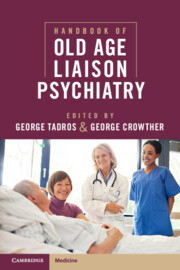Book contents
- Handbook of Old Age Liaison Psychiatry
- Handbook of Old Age Liaison Psychiatry
- Copyright page
- Contents
- Contributors
- Introduction
- Chapter 1 Psychological Well-Being in Later Life
- Chapter 2 The Epidemiology of Mental Illness in Older People in Acute Hospitals
- Chapter 3 Elderly-Friendly Care Settings and Hospitals
- Chapter 4 Communication with Older People
- Chapter 5 Privacy and Dignity in Acute Hospitals
- Chapter 6 Liaison Psychiatry and Law
- Chapter 7 Safeguarding Adults
- Chapter 8 Carers’ Needs before, during, and after Hospital Admissions
- Chapter 9 Dementia and Related Disorders
- Chapter 10 Behavioural and Psychological Symptoms of Dementia in Hospital Settings
- Chapter 11 Liaison Old Age Psychiatry Management of Delirium in Acute Hospitals
- Chapter 12 Depression and Associated Disorders
- Chapter 13 Prevention of Suicide and Self-Harm in Older People
- Chapter 14 Fear and Anxiety in Acute Settings
- Chapter 15 Late-Onset Psychosis and Related Disorders
- Chapter 16 Drug and Alcohol Misuse in Older People
- Chapter 17 Perioperative Medical Management of Older People
- Chapter 18 Parkinson’s Disease and Related Disorders in Acute Hospitals
- Chapter 19 Comprehensive Geriatric Assessment in Clinical Practice
- Chapter 20 Interface between Liaison Psychiatry Services for Older People and Wider Community Services
- Chapter 21 Psychometric Measures in Old Age Psychiatry
- Index
- References
Chapter 19 - Comprehensive Geriatric Assessment in Clinical Practice
Published online by Cambridge University Press: 04 April 2024
- Handbook of Old Age Liaison Psychiatry
- Handbook of Old Age Liaison Psychiatry
- Copyright page
- Contents
- Contributors
- Introduction
- Chapter 1 Psychological Well-Being in Later Life
- Chapter 2 The Epidemiology of Mental Illness in Older People in Acute Hospitals
- Chapter 3 Elderly-Friendly Care Settings and Hospitals
- Chapter 4 Communication with Older People
- Chapter 5 Privacy and Dignity in Acute Hospitals
- Chapter 6 Liaison Psychiatry and Law
- Chapter 7 Safeguarding Adults
- Chapter 8 Carers’ Needs before, during, and after Hospital Admissions
- Chapter 9 Dementia and Related Disorders
- Chapter 10 Behavioural and Psychological Symptoms of Dementia in Hospital Settings
- Chapter 11 Liaison Old Age Psychiatry Management of Delirium in Acute Hospitals
- Chapter 12 Depression and Associated Disorders
- Chapter 13 Prevention of Suicide and Self-Harm in Older People
- Chapter 14 Fear and Anxiety in Acute Settings
- Chapter 15 Late-Onset Psychosis and Related Disorders
- Chapter 16 Drug and Alcohol Misuse in Older People
- Chapter 17 Perioperative Medical Management of Older People
- Chapter 18 Parkinson’s Disease and Related Disorders in Acute Hospitals
- Chapter 19 Comprehensive Geriatric Assessment in Clinical Practice
- Chapter 20 Interface between Liaison Psychiatry Services for Older People and Wider Community Services
- Chapter 21 Psychometric Measures in Old Age Psychiatry
- Index
- References
Summary
Comprehensive geriatric assessment (CGA) has been one of the cornerstones of geriatric medicine since its introduction by Marjory Warren in 1936. This kind of assessment is defined as a multidimensional and multidisciplinary process related to identifying medical, social, and functional needs and developing an integrated care plan designed to meet the patien’st needs.The practice and applications of CGA have been used to various degrees in mainstream care for older people in the UK and internationally.
Some limitations still exist around the wider implementation of CGA, as its practice relies on members of the multidisciplinary team (MDT) and on an effective communication between them, the patients, and their families. This kind of assessment has been criticised for not adequately acknowledging frailty and for not using patient-reported outcome measures to test its efficacy.
Randomised controlled studies, systematic reviews, and meta-analyses provided considerable evidence for the clinical and financial effectiveness of CGA in various hospital specialties. However, there are still concerns about the generalisability of CGA in community settings. Further research to identify target populations for CGA-led interventions and a consensus on outcome measures are required to realise CGA benefits.
In this chapter we describe required skills and practical tips to deliver CGA across a variety of settings.
Keywords
- Type
- Chapter
- Information
- Handbook of Old Age Liaison Psychiatry , pp. 283 - 291Publisher: Cambridge University PressPrint publication year: 2024

